Exploring coffee pods helps you choose the right type for your brewer, ensuring a smooth brewing experience. You'll find coffee pods in various options, like K-Cups and Nespresso capsules, each compatible with specific machines. Pay attention to dimensions and manufacturer guidelines to avoid jams and warranty issues. Don't forget about sustainability; consider using reusable pods or biodegradable options to reduce waste. Popular brands offer a range of flavors, so you can discover what you love best. As you explore your choices, you'll uncover tips and tricks to enhance your coffee-making journey ahead.
Key Takeaways
- Coffee pods vary in type, including K-Cups, Nespresso capsules, and ESE pods, each designed for specific machines and brewing styles.
- Compatibility is crucial; always check manufacturer guidelines to avoid jams and potential warranty issues with your coffee machine.
- Flavor profiles differ across brands, with options like Lifeboost Coffee and Peet's Coffee offering unique blends for diverse taste preferences.
- Environmental impact is significant; consider using reusable pods or recyclable options to reduce waste and promote sustainability.
- Regular maintenance and proper cleaning of your coffee machine enhance flavor and longevity, ensuring a better brewing experience.
Overview of Coffee Pod Types
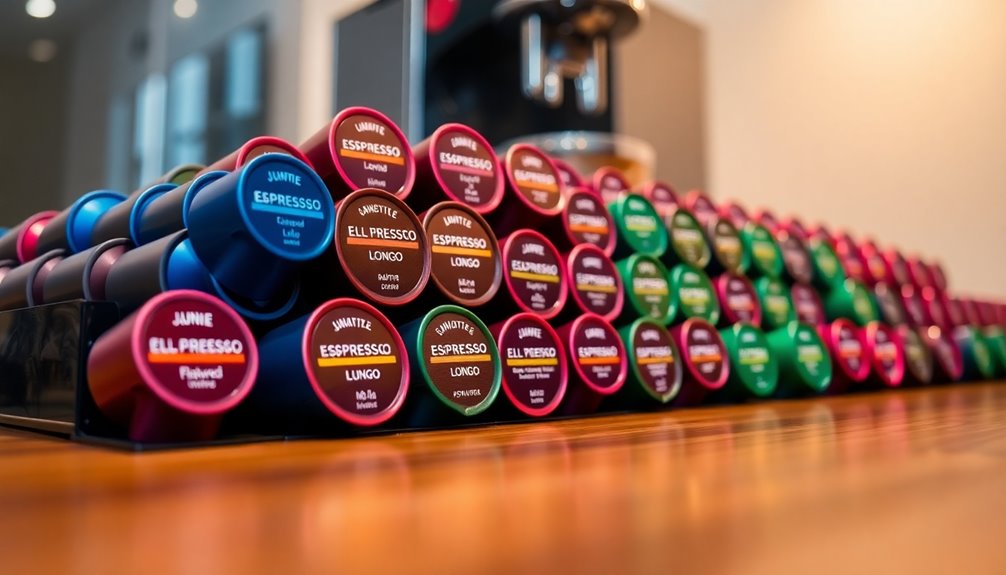
When you think about coffee pods, it's essential to recognize that they come in various types, each designed for specific brewing methods and machines.
Coffee pods are typically round, flat filters filled with pre-ground coffee, resembling tea bags. They can be made of paper or other materials and generally contain 6.5 to 9 grams of coffee. Coffee capsules, like Nespresso, are made from plastic or aluminum and often create a rich crema due to high pressure brewing. K-Cups, specific to Keurig systems, hold more coffee and offer diverse flavors. K-Cups are generally more widely available than Nespresso pods, making them a popular choice among consumers.
Other options include Nescafe Dolce Gusto and ESE Pods, which cater to unique brewing styles. Each type ensures you can enjoy your favorite coffee experience conveniently.
Understanding Compatibility Issues
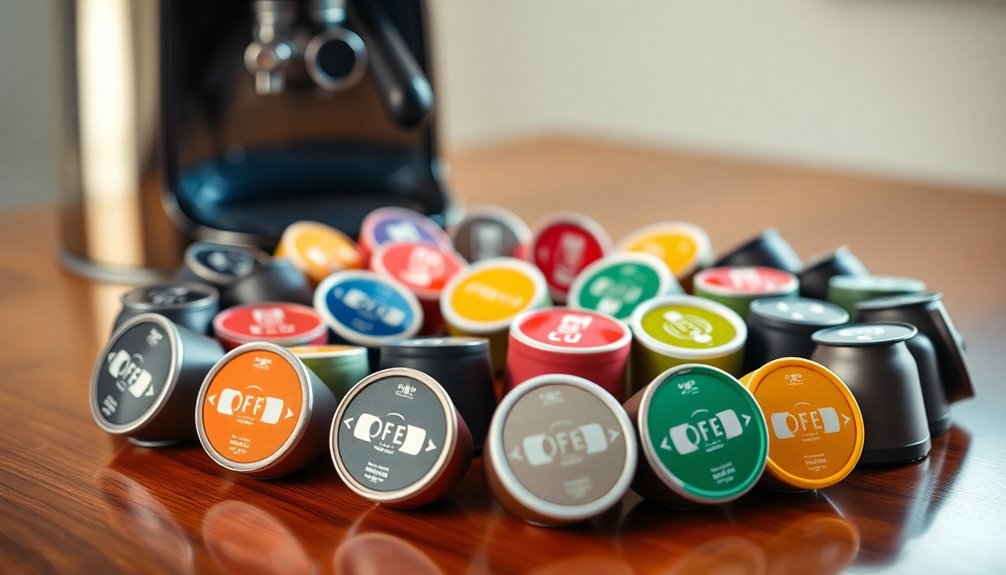
Understanding compatibility issues with coffee pods is crucial for a smooth brewing experience, as using the wrong pod type can lead to frustrating machine malfunctions.
Different coffee machines require specific pod dimensions, and using incorrect sizes can jam your machine. For instance, Nespresso pods are designed for Nespresso machines, while K-Cups are meant for Keurig brewers. Additionally, some machines, like Keurig 2.0, use proprietary technology that restricts pod acceptance, checking for authenticity. This can limit your options and even void warranties if incompatible pods are used.
Always consult your manufacturer's guidelines, and consider using universal adapters if you want flexibility. Just make sure the adapter is compatible to avoid any brewing issues. Understanding pod types is also essential to ensure you select the right option for your machine.
Major Coffee Machine Types

Choosing the right coffee pod isn't just about flavor; it also depends on your coffee machine type.
Drip coffee makers are versatile, allowing you to customize your brew with different beans and roasts. If you enjoy espresso, consider an espresso machine, which creates concentrated coffee and can whip up lattes and cappuccinos. Espresso machines generally range in price from $500 to $2,000, reflecting their complexity and capabilities.
For those who prefer stovetop brewing, Moka pots and percolators offer a strong, flavorful coffee without needing electricity. Single-serve machines provide convenience with pods, while bean-to-cup machines grind fresh beans for a rich experience.
Each machine has its unique features, so understanding them helps you choose the right coffee pod to match your brewing style and preferences.
Environmental Considerations
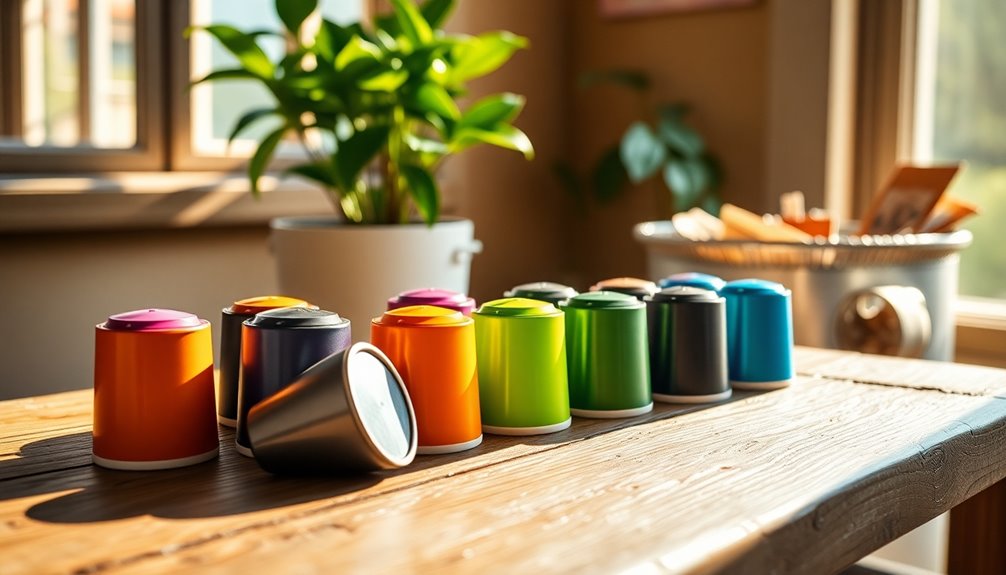
Although coffee pods offer convenience, their environmental impact is a significant concern. The production and disposal of these pods contribute to carbon emissions through raw material extraction, manufacturing, and transportation. Millions of pods end up in landfills daily, where they can take hundreds of years to decompose, leaching harmful substances into the soil and contaminating groundwater. Annually, the waste generated from these pods amounts to approximately 576,000 metric tons, amplifying the urgency for sustainable practices. Recycling and composting are challenging since separating the components isn't straightforward, and access to facilities is often limited. You can consider eco-friendly alternatives, like biodegradable or compostable pods, reusable options, or manual brewing methods.
Factors Influencing Compatibility
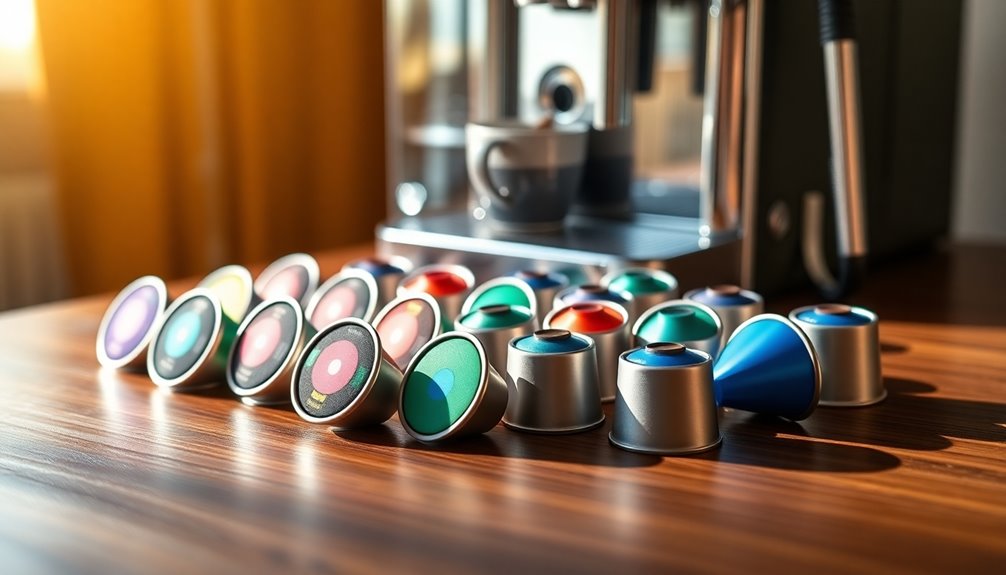
When selecting coffee pods, several key factors influence compatibility with your brewing system.
First, ensure the pods match your specific coffee machine model, like Nespresso's Original or Vertuo systems. Always check the compatibility information on the packaging to avoid fitting issues, as incompatible pods can disrupt the brewing process.
Next, consider pod dimensions; while most have a standard radius of 30.5mm, different brands may vary in design. Additionally, many coffee pods utilize plastic or aluminum materials, which can impact your choice based on environmental concerns. Choosing eco-friendly options can also contribute to improved air quality.
Additionally, your flavor and roast preferences matter—options range from light to dark, and experimenting can lead you to the perfect match.
Lastly, remember that brewing methods differ: while some pods work with machines, others can be manually brewed with hot water, so choose accordingly for optimal flavor.
Popular Brands and Varieties
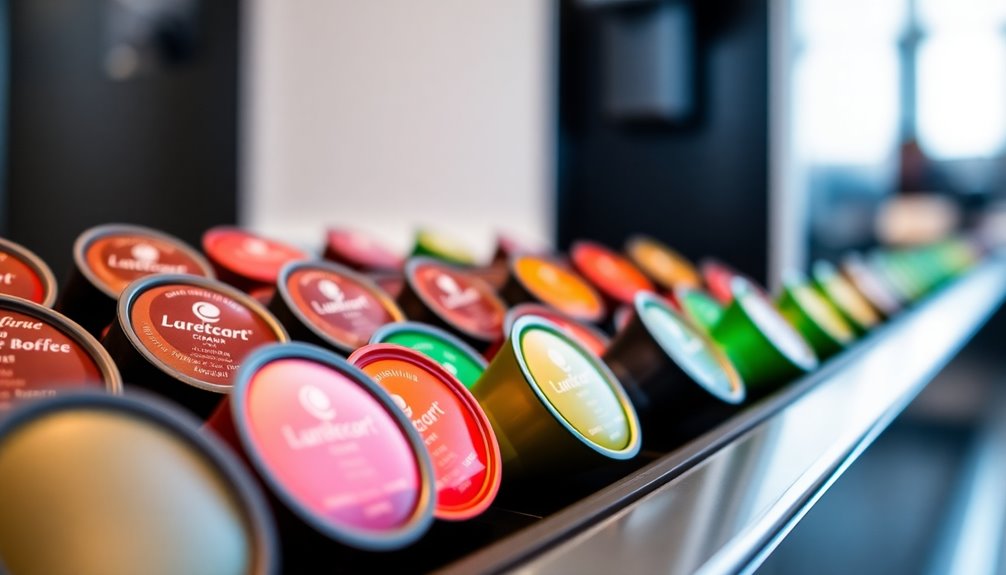
With numerous brands and varieties available, navigating the coffee pod market can be an exciting experience. Lifeboost Coffee stands out for its stomach-friendly, low-acid options, featuring unique flavors like Vanilla Chai and Highlander Grogg. Additionally, many flavored coffee pods offer a variety of flavors, from sweet to exotic, allowing consumers to easily rotate their coffee experience.
If you prefer something smooth and mellow, Krispy Kreme's Classic Coffee pods offer subtle cocoa and toasted grain notes, perfect alongside their doughnuts.
For a more artisanal touch, try Peet's Coffee, known for its range of flavors and compatibility with Keurig machines.
Starbucks also brings café quality to your home with their Blonde Roast Veranda Blend, delivering subtle nuttiness and cocoa hints.
Each brand brings something special, ensuring you can find the perfect pod for your taste preferences.
Nespresso Pod Compatibility
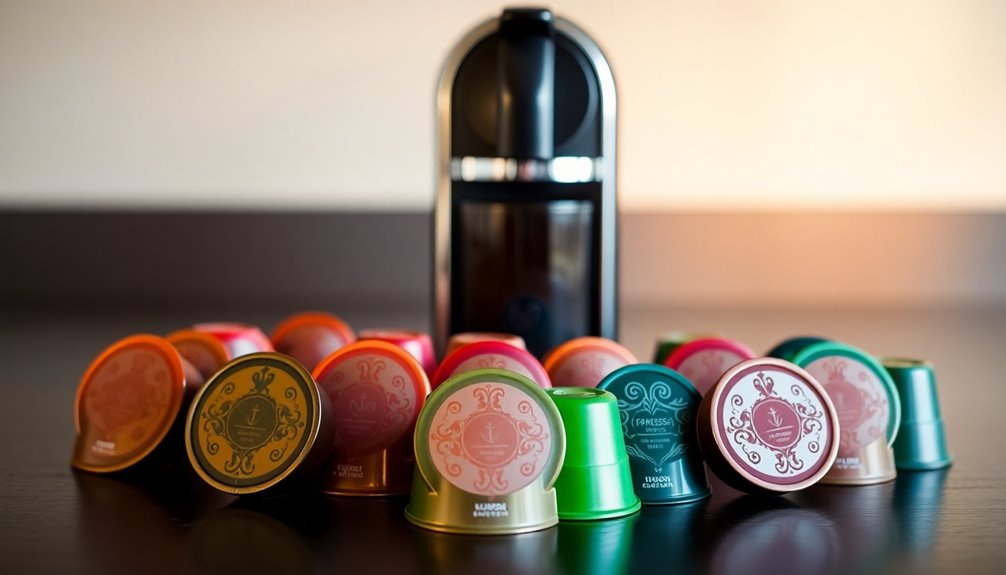
Understanding Nespresso pod compatibility is crucial for enjoying your coffee experience to the fullest. Not all Nespresso machines work with every pod, so it's essential to check compatibility before you buy.
Newer machines often prefer aluminum pods, as they pierce easily. If you own a Prodigio or Nespresso-U®, be aware that some compatible pods mightn't perform well. Additionally, many brands now offer various flavors to enhance your coffee selection.
Remember, Nespresso Original and Vertuo machines use different capsules, so they're not interchangeable. Always follow the instructions on the packaging for optimal use; proper placement of the pod is key.
Before purchasing, confirm the pod's compatibility with your machine model. Fortunately, using compatible capsules won't void your machine's warranty, but always double-check for specific restrictions.
Sustainability and Eco-Friendly Options
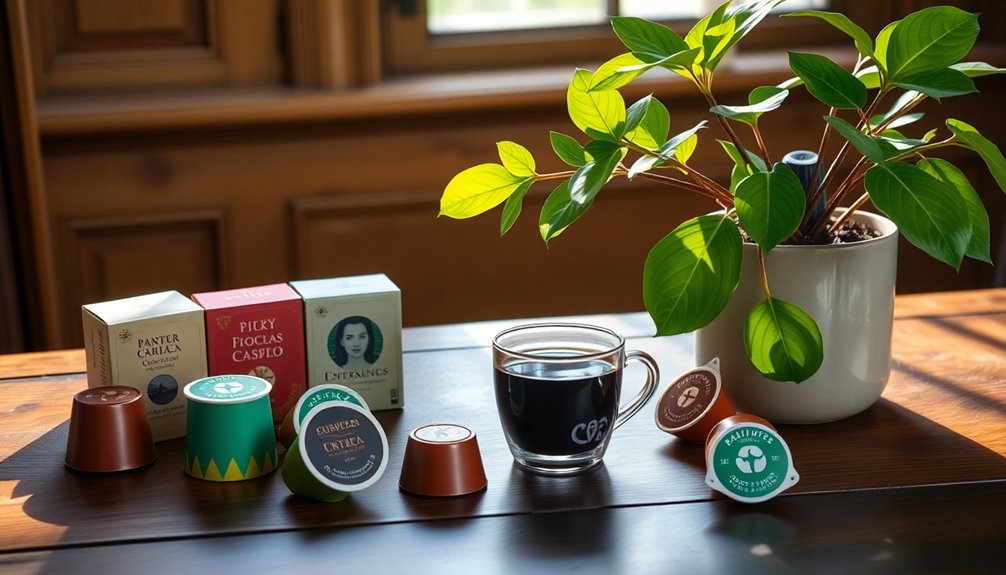
You can opt for compostable coffee pods made from plant-based materials like PHA, which break down in industrial composting within a year. Brands like Tayst and Glorybrew provide these eco-friendly options. Additionally, the use of compostable pods significantly reduces the environmental impact compared to traditional options, which can take 500 years to break down in landfills. Alternatively, recyclable aluminum pods, such as those from Cambio Roasters, can be recycled indefinitely, saving energy and reducing landfill waste. If you prefer a biodegradable option, pods made from sugarcane or sugar beet break down naturally but need specific conditions to do so. For the ultimate sustainable choice, reusable coffee pods let you enjoy your favorite flavors while minimizing waste.
Tips for Choosing Pods
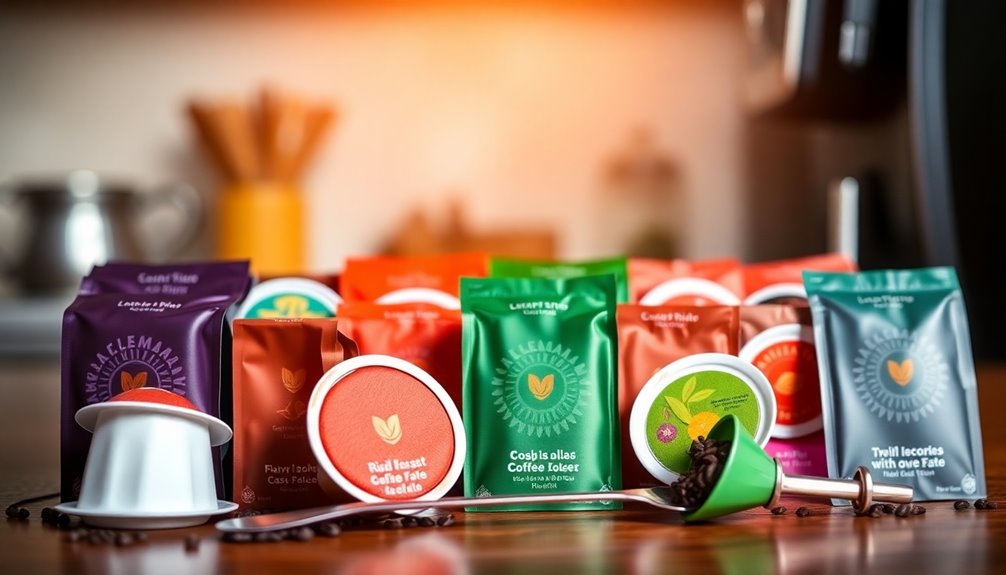
How can you ensure you're picking the right coffee pods for your machine? Start by identifying your coffee machine's brand and model, then check the manufacturer's guidelines for compatible pod types.
Knowing your machine's pod system, like Nespresso or Keurig, is crucial since some have restrictions on third-party pods. Pay attention to pod dimensions; they must match your machine's requirements to avoid malfunctions. For instance, if you own a Nespresso machine, ensure you choose pods that are compatible with Nespresso® OriginalLine to enjoy a seamless brewing experience. Additionally, consider the caffeine content of different pod options to find the best fit for your daily intake.
Consider flavor profiles and caffeine content that suit your taste. Opt for high-quality mixes to ensure great brewing results.
If you're unsure, don't hesitate to contact customer support for assistance. Lastly, always follow maintenance guidelines to keep your machine in top shape and enjoy your coffee experience fully.
Frequently Asked Questions
Can I Use My Own Coffee in Pod Machines?
Yes, you can use your own coffee in pod machines by utilizing reusable capsules.
Just make sure to choose the right reusable pod for your specific machine model.
You'll need to fill it with fine ground coffee, seal it properly, and then brew.
While it may take some practice to get the grind and amount just right, you’ll enjoy a cost-effective, environmentally friendly option that allows for personalized coffee experiences. In addition to the cost savings and eco-friendly benefits, choosing fair trade coffee also supports ethical sourcing practices and ensures that the farmers and workers involved receive fair compensation for their labor. The benefits of fair trade coffee extend beyond the cup, contributing to sustainable livelihoods and communities. By choosing this option, you can enjoy your coffee knowing that you are making a positive impact on both the environment and the lives of those who produce it.
What Are the Best Practices for Storing Coffee Pods?
To store coffee pods properly, keep them in a cool, dark place, like a pantry or cupboard.
Avoid heat sources, sunlight, and high humidity areas.
Use airtight containers to protect them from air and moisture, ensuring the container is clean and dry.
Keeping the pods in their original packaging until you're ready to brew will help maintain freshness.
Regularly check expiration dates to enjoy the best flavor and aroma.
How Do I Clean My Coffee Pod Machine?
To clean your coffee pod machine, start by descaling it using a 1:1 mixture of distilled white vinegar and water.
Brew half the solution, let it sit for 30 minutes, then complete the cycle and discard the mixture. Rinse multiple times with fresh water.
Clean the exterior and detachable parts with hot, soapy water.
Regular maintenance every three to six months will keep your machine running smoothly and enhance your coffee's taste.
Are There Coffee Pods for Cold Brewing?
Yes, there are coffee pods specifically designed for cold brewing.
You can use options like Java House or Cometeer pods, which make it easy to enjoy a smooth, low-acid coffee.
Simply add one pod to 6-8 ounces of cold water, let it steep, and you're set.
These pods are convenient for travel, requiring no special equipment.
Just a cup and water, and you'll have a refreshing cold brew ready to enjoy.
Do Coffee Pods Expire or Go Stale?
Yes, coffee pods can expire or go stale. They typically have a "best by" date that indicates peak flavor.
If stored properly, pods can last 6 to 12 months beyond this date, and some may even stay fresh for up to 2 years.
However, factors like moisture, heat, and broken seals can compromise their quality.
To maintain freshness, store them in cool, dry, airtight containers and regularly check the expiration dates.
Conclusion
In conclusion, exploring coffee pods opens up a world of flavors and convenience. By understanding compatibility and the various types of machines, you can easily find the perfect pod for your brew. Remember to consider environmental impact and look for sustainable options that align with your values. With so many popular brands and varieties available, you'll enjoy every sip while making an informed choice. Happy brewing, and may your coffee always be just the way you like it!










